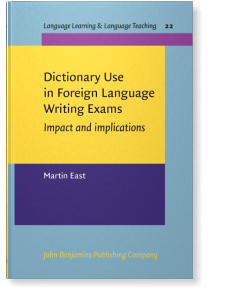Dictionary Use in Foreign Language Writing Exams
Impact and implications
This book provides an in-depth analysis of what happens when intermediate level learners of a foreign language use a bilingual dictionary when writing. Dictionaries are frequently promoted to people learning a foreign language. Nevertheless, teachers often talk about their students’ inability to use dictionaries properly, especially when they write, and this can be problematic. This book paints a comprehensive picture of the differences a dictionary makes and brings out the implications for language learning, teaching, and testing practices. It draws on research in which participants in three studies took writing tests in two test conditions – with and without a dictionary. They were also asked what they thought about the two test types. Their performances and opinions were analyzed in a variety of ways. Conclusions from the data highlight some of the practical issues to be kept in mind if we want to help foreign language learners to use bilingual dictionaries effectively when writing.
[Language Learning & Language Teaching, 22] 2008. xiii, 228 pp.
Publishing status: Available
© John Benjamins Publishing Company
Table of Contents
-
Preface | pp. vii–x
-
Acknowledgments | pp. xi–xii
-
List of key acronyms | p. xiii
-
1. What is the problem with dictionaries? | pp. 1–11
-
2. On dictionaries and writing | pp. 13–36
-
3. Does the dictionary really make a difference? | pp. 37–63
-
4. How do test takers use dictionaries? | pp. 65–93
-
5. When the dictionary becomes a liability | pp. 95–124
-
6. What do the test takers think of having a dictionary? | pp. 125–146
-
7. Some more test taker perspectives | pp. 147–168
-
8. Having a dictionary in writing exams – is it useful and is it fair? | pp. 169–185
-
9. Maximizing the opportunity and minimizing the liability | pp. 187–202
-
-
Appendix 1 | pp. 211–212
-
Appendix 2 | pp. 213–215
-
Appendix 3 | pp. 217–220
-
Appendix 4 | pp. 221–225
-
Index | pp. 227–228
“East’s study raises many tough questions and does not have easy answers; it also touches on a range of areas of great importance for the professional teacher of L2, including the prime focus of curriculum and assessment.”
Brian Ridge, Australian College of Kuwait, in Australian Review of Applied Linguistics, Volum 33, Number 1, 2010
“
Dictionary Use in Foreign Language Writing Exams contributes to ongoing debates around using or not using dictionaries in writing, whatever the context, and will keep these debates going. The book helps to make the root causes of the controversy more understandable, and alerts those who have a stake in language learning, teaching, and assessment to both the benefits and drawbacks of bilingual dictionaries and to means of improving their use. The book will help language students, at whatever level, and whatever language they are studying, to get the best out of bilingual dictionaries when writing, and it will also help language teachers help their students to use this resource to full effect. Conclusions from the data highlight some of the practical issues to be kept in mind if we want to help foreign language learners use bilingual dictionaries effectively when writing.”
SirReadalot.org, October Issue 2008
Cited by (20)
Cited by 20 other publications
East, Martin & David Slomp
Guapacha-Chamorro, María & Orlando Chaves-Varón
Pusey, Kerry & Yuko Goto Butler
Guapacha Chamorro, María Eugenia
CELEN, Kiymet Merve & Şebnem YALÇIN
Egido Vicente, María
Lefkos, Ioannis & Maria Mitsiaki
Oh, Saerhim
Sun, Peijian Paul
Lew, Robert
East, Martin
East, Martin
East, Martin
East, Martin
East, Martin
East, Martin
East, Martin
Mandalios, Jane
This list is based on CrossRef data as of 24 october 2024. Please note that it may not be complete. Sources presented here have been supplied by the respective publishers. Any errors therein should be reported to them.
Subjects
Main BIC Subject
CJA: Language teaching theory & methods
Main BISAC Subject
LAN020000: LANGUAGE ARTS & DISCIPLINES / Study & Teaching
